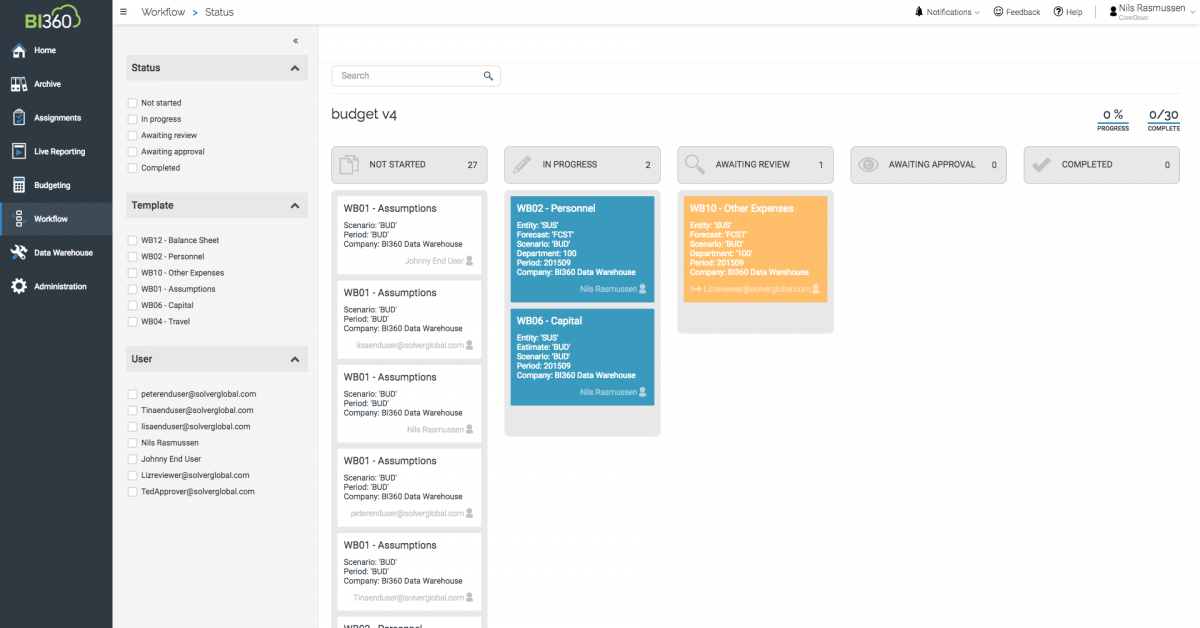Related Posts
How to Use Workflows in Your Budgeting Process
This article will describe the value of using workflows for budgeting.
 Automating manual processes sounds like a sensible idea, but which one would be the most beneficial to automate? What part of the process would make the most sense? When it comes to budgeting, particularly consolidation budgeting, automation and assignments stand out as essential features of any tool you use. Automating assignments essentially translates into a feature known as “workflows.” When implemented in the right way, workflows unite the work of separate users or departments into one overarching process. In this blog post, how workflows can save time in the budgeting process.
Automating manual processes sounds like a sensible idea, but which one would be the most beneficial to automate? What part of the process would make the most sense? When it comes to budgeting, particularly consolidation budgeting, automation and assignments stand out as essential features of any tool you use. Automating assignments essentially translates into a feature known as “workflows.” When implemented in the right way, workflows unite the work of separate users or departments into one overarching process. In this blog post, how workflows can save time in the budgeting process.
Assignments & Approvals
Assignment workflows form the basis of an organized planning process. For example, an assignment could associate a revenue budget template to one or more users based on a department. Importantly, the status of the assignment should be trackable based on templates and users. This way, an admin user can dispatch individual assignments to various users and see the progress on an “as-need” basis. A feature that allows admin users to assign deadlines would provide additional organization. For example, once a user completes his or her assignment, the department manager receives a notification to review and approve it. Given the complexities of organizations, the ability to add comments, for example, offers further clarification. This feature puts your organization in the best position to collaborate while ensuring transparency and accuracy in creating the budget.Workflow Examples
We can see the obvious benefits of organizing multiple users’ assignments in one place for processes like consolidation budgeting. Workflows can make other processes easier as well. Any budgeting process, from annual budgets to payroll, can benefit from the automated assignment and approval features described above. One can create a workflow for personnel forms, travel budgets and other expenses by assigning multiple templates to users. Likewise, any high-level processes like corporate strategy and goals can use workflows. A budgeting tool with workflow features should also allow for template selections that outline the workflow, with custom options. While applied mostly to budgeting and forecasting, workflows entail different operational members adding pieces of information into a centralized template. The ability to view all approved, pending and rejected workflows at a glance can enable high-level decisions.Cloud Software and the Future
While our focus has been about the features of workflows, it is also helpful to think about the tool itself. Elaborated on in a previous blog post, cloud-based software provides many opportunities to streamline various management processes. Cloud software can be updated from any location in real-time, making it the best choice when it comes to organization. A modern budgeting tool will also provide a better experience than older reporters and consolidation tools that are expensive to maintain. When considering budgeting and planning tools, the advantages cloud software pose are instrumental in maximizing the use of automation tools. Even though a simple consolidation process does not necessarily require automation, for big companies, workflows will automate the budget process. The upside ranges from clear expression of universal company goals to the logistical benefits of deadlines and alerts. Additionally, using automation tools should be easy by design. Consolidation tools acquired separately from your data and reporting systems allow for a gap in communication. On the other hand, tools with built-in workflows can pull numbers directly from the same source, like a data warehouse. Overall, the benefits of workflows include time saved, increased accuracy and an shared vision of the organization’s goals. If you are struggling to find a tool that checks all of these boxes, or aren’t sure how to work with the tools you already have, Solver has a team of experienced professionals that can get your organization started in upgrading your budgeting and planning process. Solver enables world-class decisions with BI360, a leading web-based CPM suite made up of budgeting, reporting, dashboards, and data warehousing, delivered through a web portal. Solver is reinventing CPM with its next generation solution. BI360 empowers business users with modern features including innovative use of Excel in the model design process. If you’re interested in learning more, our team is excited to hear about your organizational needs and goals.TAGS: Reporting, Budgeting, CPM, Dashboards
Global Headquarters
Solver, Inc.
Phone: +1 (310) 691-5300
